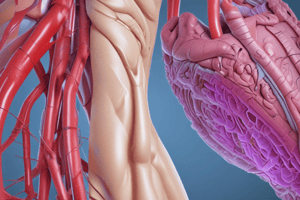Podcast
Questions and Answers
What nursing assessment should be made for acute abdomen complications?
What nursing assessment should be made for acute abdomen complications?
History of pain (type, nature, onset, location, quality), changes in bowel habits, history of trauma, gynecological history, anorexia, malaise, tachycardia, hypertension, fever, nausea/vomiting; Inspect abdomen (look, listen, feel).
What are the priority nursing interventions for acute abdomen complications?
What are the priority nursing interventions for acute abdomen complications?
Give pain meds, keep patient quiet, assess for trauma and treat if indicated.
What information should be reported to the doctor related to acute abdomen complications?
What information should be reported to the doctor related to acute abdomen complications?
Pain levels, location, quality, duration, onset time, changes in bowel habits, vital signs, nausea/vomiting, last menstrual period, trauma findings if indicated.
What orders should be anticipated to be ordered by the doctor for acute abdomen complications?
What orders should be anticipated to be ordered by the doctor for acute abdomen complications?
What labs/meds should be anticipated to be ordered by the doctor for acute abdomen complications?
What labs/meds should be anticipated to be ordered by the doctor for acute abdomen complications?
What nursing assessment should be made for CHF complications?
What nursing assessment should be made for CHF complications?
What are the priority nursing interventions for CHF complications?
What are the priority nursing interventions for CHF complications?
What information should be reported to the doctor related to CHF complications?
What information should be reported to the doctor related to CHF complications?
What orders should be anticipated to be ordered by the doctor for CHF complications?
What orders should be anticipated to be ordered by the doctor for CHF complications?
What labs/meds should be anticipated to be ordered by the doctor for CHF complications?
What labs/meds should be anticipated to be ordered by the doctor for CHF complications?
What are the signs of digoxin toxicity?
What are the signs of digoxin toxicity?
What are normal digoxin medication lab values?
What are normal digoxin medication lab values?
What nursing assessment should be made for DKA complications?
What nursing assessment should be made for DKA complications?
What are the priority nursing interventions for DKA complications?
What are the priority nursing interventions for DKA complications?
What information should be reported to the doctor related to DKA complications?
What information should be reported to the doctor related to DKA complications?
What orders should be anticipated to be ordered by the doctor for DKA complications?
What orders should be anticipated to be ordered by the doctor for DKA complications?
What labs/meds should be anticipated to be ordered by the doctor for DKA complications?
What labs/meds should be anticipated to be ordered by the doctor for DKA complications?
What nursing assessment should be made for AMI complications?
What nursing assessment should be made for AMI complications?
Flashcards are hidden until you start studying
Study Notes
Acute Abdomen Complications
- Assess history by gathering details on type, nature, onset, location, and quality of pain, as well as any changes in bowel habits, trauma history, gynecological history, and presence of symptoms like anorexia, malaise, tachycardia, hypertension, fever, and nausea/vomiting.
- Perform a thorough abdominal inspection: look for signs, listen for bowel sounds, and palpate the abdomen for tenderness.
- Priority interventions include administering pain medications, keeping the patient calm, and assessing trauma, with treatment provided as necessary.
- Report significant findings to the doctor, such as pain characteristics, vital signs, recent bowel habit changes, nausea/vomiting, last menstrual period, and trauma evidence.
- Anticipated orders from the doctor may include pain medications, NPO status, laboratory tests, IV fluids, nasogastric suction, antiemetics, narcotics, analgesics, and potentially consulting a surgeon.
- Essential labs to expect include CBC for infection signs, lipase for pancreatitis, serum HCG for pregnancy, BMP for electrolytes, and urinalysis to check for pyuria or hematuria.
Congestive Heart Failure (CHF) Complications
- Key assessments involve auscultating lung fields, heart sounds, and monitoring vital signs, alongside gathering history of weight changes, activity limitations, sleep habits, and edema.
- Provide priority nursing interventions like administering oxygen, elevating the head of the bed, establishing IV access, and continuous monitoring with cardiac monitoring and pulse oximetry.
- Report pertinent information to the doctor, including vital signs (BP, respiratory rate, pulse), weight changes, activity limits, sleep patterns, medications, and edema details.
- Anticipated medical orders may involve oxygen therapy, ECG, chest X-ray, ABGs, cardiac monitoring, diuretics, potassium supplements, and relevant lab tests.
- Labs to monitor include electrolyte levels, BUN & creatinine, BNP for heart failure status, and cardiac enzymes, plus echocardiograms for heart function assessment.
- Important medications include diuretics for fluid management, digoxin for contractility improvement, ACE inhibitors, beta-blockers, and vasodilators to reduce cardiac workload.
Diabetic Ketoacidosis (DKA) Complications
- Nursing assessment focuses on signs of dehydration, blood pressure changes, metabolic acidosis symptoms, tachypnea or Kussmaul breathing, nausea/vomiting, abdominal tenderness, decreased level of consciousness, and cardiac abnormalities.
- Priority interventions include closely monitoring input and output, replacing fluids as necessary with normal saline, monitoring blood glucose levels, cardiac monitoring, placing the patient on NPO status, and providing reassurance.
- Report to the doctor critical information such as blood glucose levels, level of consciousness, cardiac changes, pain details, vital signs, and gastrointestinal symptoms.
- Anticipated doctor orders likely include labs: serum glucose, electrolytes, BUN, urinalysis, CBC, and ketones, along with a CT scan of the head if mental status is altered and possible intubation.
- Key lab findings may indicate serum/urine ketosis, glycosuria, hyponatremia, elevated BUN, metabolic acidosis, increased serum osmolality, and significant anion gap.
- Medications to anticipate involve insulin drips for glucose control, potassium for electrolyte balance, and IV normal saline for hydration.
Acute Myocardial Infarction (AMI) Complications
- Further assessment criteria for AMI include gathering a detailed history which encompasses current symptoms and risk factors.
Studying That Suits You
Use AI to generate personalized quizzes and flashcards to suit your learning preferences.




